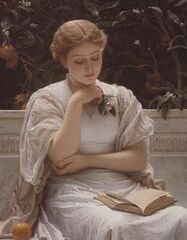
“O Happiness! where is thy sequestered retreat! Thou hast escaped my most ardent search admist the noise, the bustle, the din, and riot of the city; and here, in this solitary recess, where I vainly expected to have found thy habitation, thou again deceived me, and corrodest my mind with the phantoms of Deception. Happy infancy! that always givest enjoyment without the fretting sting of care!.... (etc.)”
I wonder when lapsing into thou/thy language in moments of high emotion died out of literature?...
 The Angry Father, John Opie
The Angry Father, John Opie The action commences when our hero refuses to marry the girl picked out by his father, Lord Wilton, because she is empty-minded and ignorant (as mentioned in my series on female education in novels). Dad is incensed and Henry decides to get out of town. He flees the family estate and alights in a random village in Northumberland, where (spoiler alert) he will find a solution to the answer of how to appease his father.
Meanwhile, back at home, Lord Wilton tries to disinherit Henry by removing the entail on the property, over the mild objections of his long-suffering wife (who is mentioned in my post on the "bear and forbear" heroine). As well, Henry's sister Antonet is forbidden to communicate with the man she loves and she is kept a virtual prisoner.
That’s the opening premise, but I’m here to give you a sample of a preachy heroine. Henry and Olivia meet while she is out walking with her foster-parents Sir Robert and Lady Bertram. Henry and Olivia start philosophizing over the ruins of a castle and ba-dah! love is in the air after Olivia opines: “Every remnant of antiquity is of sterling value. Though I view it not with the foolish veneration or the minute inspection of a virtuoso… the manners, the customs, the history of our ancestors, are often more fully elucidated by these ancient remains, than by any written evidence or mutilated record. These remains speak with impartiality; they are frequently demonstrative proofs of the prejudices of the historian, and the predilection of the interested individual.”
Yes, the girl Henry rejected is “giddy, inconsiderate, and uninformed,” while in contrast, “Olivia is serious, even on the most trifling subject.”
Our hero swiftly falls for her but is momentarily thrown back by learning she is not “the daughter, but the adopted child of Sir Robert Bertram.” He doesn’t say why, exactly, this is an impediment, so I suppose the readers are supposed to understand. Is it because he doubts whether she has a dowry? Or because her actual bloodlines are in doubt?
Nor does the author explain how Henry overcomes his reluctance, but perhaps learning that Sir Robert has settled fifty thousand pounds on her helps. Anyway, he slips a love letter into her hand, and she sends an answer the next day via their mutual friend the clergyman. Her long, very formal, letter starts with a passage about how flattery is a delusive snare and: “it is a duty incumbent upon her to weigh with deliberation, not only every sentence, but every word, before she begins to make the application, which may be instrumental in leading her astray from the paths of rectitude and filial duty…"
Henry vows to woo and win her, in between chatting with the clergyman about the ancient Greeks and performing generous acts of charity.
 "fudgety": one reader penciled in his verdict at the end of vol. one.
"fudgety": one reader penciled in his verdict at the end of vol. one. Olivia calls herself the “child of misfortune.” She knows who she is, but for some unspecified reason she is not able to reveal the truth about her parentage to the hero. She just dashes out of the room because it is too affecting to talk about. That’s not her only problem: Olivia has other persistent suitors, and they are both off their heads. One is an outright lunatic, who talks as lunatics do in 18th century novels: “Do you pity me, Olivia? Here, take this woodbine, smell it—it is very sweet, and won’t do you half the harm that a bloody husband will. –Hush, hush, don’t tell secrets. –Blood, blood, wounds, gaping wound, are not fit companions for a lady’s ear. I’ll fight none, Olivia—" While the other is a deranged stalker, who challenges Wilton to a duel. Wilton, being a conventional young gentleman who must defend his honor, accepts the challenge. Olivia lectures him: “And how could you, Wilton, so notoriously transgress against the sacred bonds of humanity, as to be guilty of the dreadful attempt of sending a thoughtless soul, or rushing voluntarily yourself, into the awful presence of your Omnipotent Creator, uncalled and unprepared?”
“This,” write the hero, “was expressed with so much sweetness, with such a look of tenderness and complacency, as quite deprived me of the power of articulation for a few seconds…” He still goes ahead and fights the duel, which he survives.

Indeed, how could our hero, the heir to an earldom, find happiness by marrying a beautiful, intelligent, heiress? How, how could they be happy in this vale of tears? “Ah Mr. Wilton, you are not that novice in the world… as really to conclude, that the bare possession of my affection would be sufficient to counterbalance the many uneasinesses, the warping discontents, the gloom of sorrow, and the gnawing stings of cool neglect, which are constantly floating in this temporary scene of casual existence.”
Henry's vindictive rival also survives, but fakes his own death. Henry is accused of murder and thrown in prison. Through a happy coincidence, the plot against our hero is discovered. Henry also learns that Olivia is the daughter--by a first marriage--of Lord Wilton's neighbour. By marrying Olivia, our hero is obeying his father's injunction to marry the daughter of their neighbour! Thus, the scruples of the heroine are overcome. Antonet is forgiven for eloping with Mr. Benfield, and given a choice, I'd rather be invited for dinner with the Benfields.
Two reviewers of this novel, while praising its moral lessons, opined that Rev. Thompson was a little preachy. They also both suggested that perhaps women are better at this novel-writing business than men. One critic said, “in the minuter points of delicate incident, there is not a milliner’s apprentice who hastens with her literary first-born to Leadenhall-Street, but will excel not only Mr. Thomson, but probably all the senior fellows of either University. As a Novel, we think this work liable to some exceptions; as a string of dissertations on the parental authority and its abuse, these volumes deserve praise.”
 Judging you
Judging you I read a few chapters but quickly switched to skimming Agnes, or the Triumph of Principle (1822). The heroine, Agnes Offley, preaches awfully. In the first chapter she is "led into a scene of festivity against her wishes," namely, she is dragged along to a ball. She sits on the sidelines. Lord Osborn, a young man of good fortune in want of a wife, goes over to talk with her out of idle curiousity. “Should I accept your obliging invitation (to dance)," [she tells him], "I should incur the risk of being ensnared into a succession of amusements, perilous in the proportion in which they are delightful, and thus becoming a lover of pleasure more than a lover of God.”
The Monthly Review pointed out the whole thing was unrealistic: "It is doubtless right to defend the religion which we profess... but we are now called to admire a plain but pious young lady, who in a ball-room... delivers long religious lectures, and... passes nearly an hour in bestowing serious exhortations on a gentleman who is an utter stranger to her."
In subsequent scenes, the other young people in the book persist in asking Agnes questions about her religious beliefs and her opinions on things like card-playing and skipping church attendance. Whether they are asking her earnestly or sarcastically, I am not always certain, but of course, she answers them. In reality, I suspect most young people would cross the street to avoid her.
As for plot: the evil Janet, Agnes's love rival for the handsome Lord Osborn, manages to sow doubt in Osborn's mind -- why does Agnes go out by herself and refuse to tell people where she's gone? It turns out that she performs charitable deeds, such as attending at the bedside of a repentant dying woman.
Agnes's speeches, and the narration, are heavily laced with mini-quotes. Here is a typical Agnes speech: Lord Osborn asks her to marry him and she hesitates because he is not nearly so religiously observant as she is. He suggests that if they got married, she could reform him.
“It certainly is possible,” she replied; “I have heard of, and known, such instances; yet, on the other hand, I have known more instances, in which the world’s abettors have prevailed, and where the professed follower of God has been won by the ascendant influence of a ‘dear ungodly companion,’ to return to the ‘City of Destruction.’ –To choose a path wherein danger is co-equal with safety, when a more secure one lies before us, is presumption that merits punishment, and one that I have no courage to attempt; I should feel as though I were hoarding the heritage of heaven, and doing despite to the Spirit of Grace, were I to assume to myself the power of unreservedly swaying the desires of a heart which the mercies of Omnipotence have as yet failed to conquer.”
“'Enough, Miss Offley, enough,' cried Osborn."
The Monthly Review wrote: "Any female, who should thus violate propriety, would not only fail to obtain the reward assigned to Agnes, namely, a converted and titled lover, but would probably injure the sacred cause which she intended to serve. We may add that the general conversation, which is here supposed to take place among young people of fashion, is far too strained, affected, and flowery, to be ever tolerated in real life…”
Agnes, or the Triumph of Principle, does not conclude with the wedding of Lord Osborn and Agnes. The author is so focused on eternity that s/he includes Agnes's Christian deathbed scene after fifteen years of happy married life.

 RSS Feed
RSS Feed